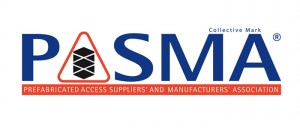
PASMA (Prefabricated Access Suppliers’ and Manufacturers’ Association) has recently unveiled their latest specification, the PAS 250, which lays out the minimum safety and performance criteria for low level work platforms, which are usually referred to in the trade as pulpits and podiums.
This set of criteria is expected to become a British Standard by 2016 and this will lead to adoption by other organisations such as the Health and Safety Executive (HSE), the Hire Association Europe (HAE) and the UK Contractors’ Group (UKCG). The association has urged buyers and users to watch for the specification on any item they will be using, because it will show that the piece of equipment meets the standards which must be adhered to by anyone working off ground level.
It doesn’t have to be high to be dangerous
As soon as anyone steps up from ground level, the danger of their position increases and although podiums and pulpits are not very high off the ground, they can still be dangerous to use and also dangerous for others working below.
With rails to give stability and also to prevent falls, most are extremely safe, but if a platform has not been put together correctly, there can be problems if a piece falls off when it is in use. Even if the platform is not much above head height, if the pole falls on someone, it can be catastrophic. Similarly, if a low pole falls, it could constitute a trip hazard on the ground.
Standards and training working together
Standards of equipment are very important and it is clear that a shoddy piece of equipment, particularly when combined with working at a height, can be catastrophic in terms of accident potential. Training, however, is the second piece of the puzzle and is in many ways equally important, if not more so, because the very best quality equipment, if put together wrongly, can be an accident waiting to happen.
Training should cover all aspects of using equipment and should include modules on how to erect platforms safely and how to spot problems while the platform is in use. Because of this it is often recommended that even staff who will not be expected to work at a height should receive appropriate training, because they may spot an error that a user might miss.
Training doesn’t take long and could save a life
Training is usually a day or so and that isn’t really long when you consider that it could save a life or at the very least serious injury. Managers are also encouraged to train, because apart from anything else it provides them with the tools to make decisions on timing of jobs and what can be expected of staff. They can also advise on safety and risk assessment and in house cascading of information so training a manager is never time wasted.
As well as low level platforms there are PASMA training programmes for working on powered equipment, ladders and towers and most employers opt for training across the different ranges, to make staff empowered to work with whatever equipment is provided.